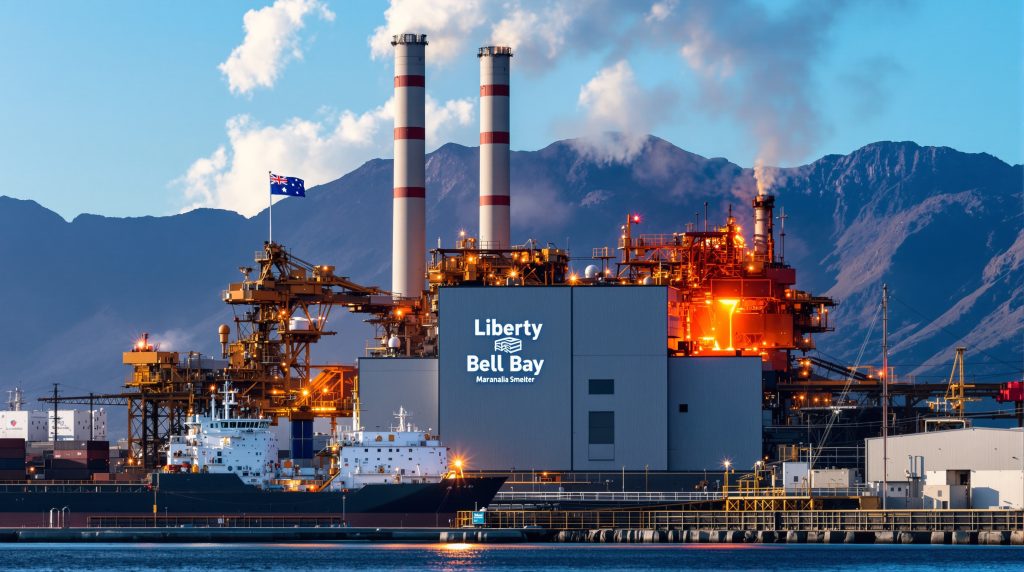Liberty Bell Bay Smelter: Manganese Shipment Revives Operations After Financial Struggles
What Is the Liberty Bell Bay Manganese Smelter?
Australia's Only Manganese Alloy Producer
Liberty Bell Bay stands as Australia's sole manganese alloy smelter, producing critical materials that strengthen steel products across various industries. Located in George Town in Tasmania's north, the facility employs approximately 250 workers, making it one of the region's largest industrial employers. The smelter specializes in manufacturing ferro manganese and silicomanganese, essential components that enhance the durability and performance of steel products worldwide.
The facility boasts an annual production capacity of approximately 270,000 tonnes of manganese alloys, establishing it as a significant player in the global manganese processing industry. Previously known as the Tasmanian Electro Metallurgical Company (TEMCO), the smelter has been a cornerstone of Tasmania's industrial landscape for decades.
Strategic Importance to Australian Manufacturing
The facility represents a critical link in Australia's manufacturing and resource processing capabilities. As the country's only manganese alloy producer, Liberty Bell Bay plays a strategic role in the domestic steel supply chain and contributes significantly to Tasmania's export economy.
One of the smelter's key competitive advantages is its access to Tasmania's renewable hydroelectric power, positioning it as one of the world's more environmentally sustainable ferroalloy operations. This green energy advantage is increasingly valuable as global markets shift toward lower-carbon production methods and decarbonisation benefits become more apparent for resource industries.
The facility's importance extends beyond its production capabilities—it represents Australia's ability to add value to raw materials rather than simply exporting them. This aligns with national strategic objectives to develop more sophisticated manufacturing capabilities and reduce dependence on imported processed materials.
Why Did Liberty Bell Bay Face Operational Challenges?
Global Market Pressures and Supply Chain Disruptions
In May 2025, Liberty Bell Bay announced it would enter a period of "limited operations" due to multiple converging challenges. The company cited ongoing difficulties with manganese ore supply as the primary factor, compounded by international market volatility that made consistent production increasingly difficult to maintain.
Additional pressures came from tariffs impact markets significantly, especially those imposed by the United States under the Trump administration, which further strained the smelter's financial viability. These tariffs targeted imported steel products and related materials as part of broader trade policies aimed at protecting domestic American manufacturers, creating significant headwinds for international producers like Liberty Bell Bay.
The combination of supply chain disruptions, price fluctuations, and trade barriers created a perfect storm that made continued full-scale operations financially unsustainable without intervention.
Ownership Structure and Parent Company Issues
The smelter operates under the ownership of GFG Alliance, an international conglomerate headed by British businessman Sanjeev Gupta. GFG acquired the facility in 2020 as part of its global expansion strategy in metals and energy.
This connection has raised concerns, as GFG has faced significant financial difficulties with other assets in its portfolio. Most notably, the company's Whyalla steelworks in South Australia was forced into administration by the South Australian government in February 2025 after sustained financial losses. This precedent has created additional uncertainty about GFG's long-term commitment to and financial capacity for supporting Liberty Bell Bay smelter manganese shipment operations.
The Australian Securities and Investments Commission (ASIC) has further complicated matters by taking legal action against Liberty Bell Bay, adding regulatory pressure to the company's existing operational challenges.
Table: Factors Contributing to Liberty Bell Bay's Operational Challenges
| Challenge Factor | Impact on Operations |
|---|---|
| Manganese ore supply disruptions | Forced production slowdown due to insufficient raw materials |
| Global price volatility | Reduced profit margins and financial sustainability |
| US tariff implementation | Decreased competitiveness in key export market |
| Parent company (GFG) financial issues | Reduced investment capacity and operational uncertainty |
| Regulatory scrutiny | Additional compliance pressures and legal concerns |
How Has the Tasmanian Government Intervened?
$20 Million Government Loan Package
The Tasmanian government has provided significant financial support to Liberty Bell Bay through a $20 million loan specifically designed to restart operations. This funding enabled the purchase of the recent manganese ore shipment, which marks the end of the limited operations period that began in May 2025.
The government intervention underscores the smelter's importance to Tasmania's industrial sector and regional employment. This loan represents a substantial public commitment to preserving the facility's operations during a period of financial uncertainty and supply chain challenges.
The terms and conditions of the loan have not been publicly disclosed, raising questions about repayment schedules and whether taxpayers are adequately protected should the company's financial situation deteriorate further.
Political Perspectives on the Support Package
While the government loan has provided immediate relief, political figures have expressed varying views on the intervention's long-term effectiveness. Labor's energy spokesperson, Janie Finlay, acknowledged the shipment provided temporary certainty for workers but emphasized the need for a comprehensive long-term strategy.
Finlay highlighted ongoing concerns about the smelter's financial viability under its current ownership structure, noting that without decisive action, uncertainty would continue to affect workers and their families. Her statements reflect broader political concerns about the sustainability of the government's approach to supporting the facility.
The Tasmanian Premier Jeremy Rockliff has made it clear that while the government has stepped in with financial support, the responsibility for the smelter's long-term viability ultimately rests with GFG Alliance. This position suggests there may be limits to future government intervention if the company cannot establish a sustainable operational model.
What Does the Manganese Shipment Mean for Operations?
Resumption of Production Activities
The arrival of the manganese ore shipment on October 5, 2025, represents a critical turning point for Liberty Bell Bay after months of limited operations. The delivery enables the smelter to resume more normal production levels, at least temporarily, bringing relief to the facility's workforce and local community.
However, industry experts note that a single shipment typically supports only about 20 days of operations, raising questions about the facility's medium-term supply security. This short operational window creates an ongoing cycle of uncertainty, with each shipment providing only brief periods of stability.
The shipment's arrival marks the formal end of the "limited operations" period that began on May 19, 2025, though the underlying challenges that led to that situation have not been fundamentally resolved.
Workforce Implications and Community Impact
For the approximately 250 workers employed at Liberty Bell Bay, the shipment provides welcome but limited relief from months of uncertainty. According to Anthony Bevan from the Australian Workers Union, employees remain anxious about future shipments and long-term job security.
The situation has been "mentally draining" for workers, many of whom are part of the George Town community that heavily depends on the smelter for economic stability. The typical 20-day production cycle between shipments means that employees face a perpetual state of uncertainty, with concerns about job security never fully resolved.
This workforce anxiety extends beyond the smelter itself to impact the broader George Town community, where local businesses and services depend on the economic activity generated by Liberty Bell Bay employees and operations.
What Challenges Remain for the Smelter's Future?
Supply Chain Vulnerabilities
Despite the recent shipment, Liberty Bell Bay faces ongoing challenges in securing a reliable supply of manganese ore. The typical 20-day turnaround between shipments creates a perpetual cycle of uncertainty, with workers and management constantly concerned about when the next delivery will arrive.
This supply vulnerability represents a fundamental weakness in the smelter's operational model. Without a more stable and predictable supply chain, the facility will continue to face periodic production disruptions and the associated financial and workforce challenges.
Industry analysts suggest that developing longer-term supply contracts with multiple ore providers might help mitigate this vulnerability, though such arrangements typically require stronger financial positioning than the smelter currently enjoys.
Financial Sustainability Questions
Premier Jeremy Rockliff has emphasized that while the government has provided substantial support, the responsibility now lies with GFG Alliance to ensure the smelter's ongoing viability. His statement that the company needs to "crack on with it and get on with the job" reflects growing expectations that GFG must demonstrate a sustainable business model beyond government assistance.
Financial sustainability will require addressing multiple interrelated challenges, including securing reliable ore supplies at competitive prices, managing production costs in an environmentally responsible manner, and finding markets willing to pay premium prices for the smelter's products despite international competition.
The parent company's broader financial difficulties add another layer of complexity, as GFG Alliance may have limited resources to invest in improving Liberty Bell Bay's operations or weathering temporary market downturns.
Regulatory and Legal Considerations
Beyond operational challenges, Liberty Bell Bay faces additional scrutiny from regulatory bodies. The Australian Securities and Investments Commission (ASIC) has taken legal action against the smelter, adding another layer of complexity to its recovery efforts.
These legal proceedings could potentially impact investor confidence and future financing options. The specific nature of ASIC's allegations has not been fully disclosed publicly, but regulatory actions typically raise concerns about governance, financial reporting, or compliance issues that may require significant management attention and resources to address.
The combination of operational, financial, and regulatory challenges creates a complex environment for Liberty Bell Bay's leadership and raises questions about the facility's long-term prospects under its current ownership and business model.
How Does Liberty Bell Bay Fit Into Australia's Resource Sector?
Strategic Position in Mineral Processing
Liberty Bell Bay represents a critical downstream processing capability in Australia's resource sector. As the country seeks to move beyond simply exporting raw materials, facilities like Liberty Bell Bay demonstrate value-adding manufacturing that transforms Australian resources into higher-value products.
This aligns with national objectives to strengthen domestic manufacturing and resource processing. Australia holds significant manganese reserves, but without processing facilities like Liberty Bell Bay, the country would be forced to export raw ore and import finished alloy products at a higher cost.
The smelter's capacity to produce both ferro manganese and silicomanganese provides flexibility to serve different market segments and adapt to changing demand patterns in the steel industry.
Employment and Regional Economic Impact
The smelter's significance extends beyond its production capabilities to its role as a major employer in Tasmania's north. With approximately 250 full-time positions, Liberty Bell Bay provides substantial economic benefits to the George Town area.
These jobs typically offer higher wages than the regional average and require specialized skills that support a more diverse workforce. The economic multiplier effect of these positions extends to local businesses, housing markets, and community services that depend on the spending power of smelter employees.
Local business owners and community leaders have expressed concern about the potential ripple effects if the smelter were to close permanently, highlighting the facility's importance to the region's economic and social fabric.
What Are the Next Steps for Liberty Bell Bay?
Short-Term Operational Outlook
While the recent manganese shipment has allowed operations to resume, uncertainty remains about subsequent deliveries. Neither the company nor government officials have provided clear information about when the next shipment will be ordered or delivered.
This lack of transparency contributes to ongoing anxiety among workers and the broader community. Industry experts suggest that establishing a more predictable shipment schedule would help stabilize operations and reduce workforce stress, but this depends on securing reliable supply arrangements and the financial resources to maintain them.
The immediate focus will likely be on maximizing production efficiency during the current operational window to generate revenue and demonstrate the facility's continued viability to both government stakeholders and parent company decision-makers.
Long-Term Viability Considerations
For Liberty Bell Bay to achieve sustainable operations, several fundamental issues must be addressed. These include securing reliable ore supply chains, improving financial performance amid global market pressures, and resolving questions about parent company GFG Alliance's commitment to the facility.
Without progress on these fronts, the smelter may face recurring cycles of operational disruption. Industry analysts suggest several potential pathways forward, including seeking new investment partners, restructuring ownership arrangements, or developing more integrated relationships with steel producers who depend on manganese alloys.
The Tasmanian government has signaled that while it remains supportive of the facility's continued operation, there are limits to public financial support, placing the onus on GFG Alliance to demonstrate a credible path to sustainable operations.
Table: Potential Pathways for Liberty Bell Bay's Future
| Scenario | Key Requirements | Likely Outcomes |
|---|---|---|
| Sustainable recovery | Consistent ore supply, improved market conditions, parent company stability | Long-term employment security, continued manufacturing capability |
| Ongoing government support | Regular public funding interventions, political will to maintain operations | Temporary stability but persistent uncertainty |
| Ownership restructuring | New investors or ownership model | Potential operational changes but improved financial foundation |
| Permanent closure | Failure to secure sustainable business model | Significant regional economic impact, loss of strategic manufacturing capability |
How Important Is Manganese Processing to Australia?
Critical Mineral Supply Chain Significance
Manganese alloys are essential components in steel manufacturing, with applications ranging from construction to automotive production. Australia holds significant manganese reserves, but Liberty Bell Bay represents the country's only facility for processing this resource into higher-value alloy products.
This capability gap highlights the strategic importance of maintaining domestic processing capacity. Without facilities like Liberty Bell Bay, Australia would be forced to rely entirely on foreign manufacturers for processed manganese products, creating potential supply vulnerabilities and reducing the economic value captured from domestic resources.
The strategic importance of manganese has grown in recent years as it features in various emerging technologies, including certain battery formulations and specialized steel alloys used in renewable energy infrastructure. This makes it a key element in Australia's critical minerals strategy going forward.
Export Market Opportunities
Despite recent challenges, global demand for manganese alloys remains strong, particularly in growing Asian economies. Liberty Bell Bay's production capacity of approximately 270,000 tonnes per annum represents a significant export opportunity for Tasmania and Australia more broadly.
The facility's access to renewable energy also positions its products favorably in markets increasingly concerned with carbon footprints. As global steel producers face growing pressure to reduce emissions, manganese alloys produced using hydroelectric power offer environmental advantages over those manufactured with coal-based electricity.
These green credentials could potentially command premium pricing in environmentally conscious markets, though realizing this potential would require targeted marketing efforts and possibly formal carbon accounting certification. Furthermore, developing mineral beneficiation insights could help Australia maximize the value from minerals like manganese.
The recent manganese mine expansion in other parts of Australia demonstrates the growing importance of this sector to the national economy.
Disclaimer: This article contains analysis of industrial and market conditions that may change rapidly. While efforts have been made to ensure accuracy, predictions about future market conditions, company performance, or regulatory outcomes should be considered speculative. Readers should consult multiple sources when making business or investment decisions related to the manganese or steel industries.
Ready to Spot the Next Major ASX Mining Discovery?
Discover why significant mineral discoveries can lead to substantial returns by exploring Discovery Alert's dedicated discoveries page, where their proprietary Discovery IQ model helps investors identify actionable opportunities before the broader market recognises their potential.




